The original inhabitants of Mauritania were the Bafour, presumably a Mande ethnic group, connected to the contemporary Arabized minor social group of Imraguen ("fishermen") on the Atlantic coast.

Mauritania is a presidential democracy, but has suffered from repeated military coups since its Independence in November 1960. For 18 years after independence, Mauritania was a one-party state under Moktar Ould Daddah. This was followed by decades of military rule. The first fully democratic presidential election in Mauritania occurred on 11 March 2007, which marked a transfer from military to civilian rule following the military coup in 2005. The election was won by Sidi Ould Cheikh Abdallahi, who was ousted by another military coup in 2008 and replaced by general Mohamed Ould Abdel Aziz. Mauretania underwent its first peaceful transition of power after the 2019 presidential election, although this was between two presidents of the ruling UPR party and former army generals.
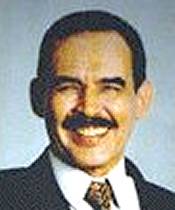
Maaouya Ould Sid'Ahmed Taya is a Mauritanian military officer who served as the President of Mauritania from 1984 to 2005. During his presidency, he pursued policies of Arab nationalism while deepening ties with the United States.
Sghair Ould M'Bareck is a Mauritanian politician. He was the 9th Prime Minister of Mauritania from July 6, 2003, when he was appointed by President Maaouya Ould Sid'Ahmed Taya following an attempted coup in the previous month, until August 7, 2005, when he resigned following a successful coup against Taya. Ould M'Bareck is a Haratin.

The Union for Democracy and Progress is a political party in Mauritania. The UDP is led by Naha Mint Mouknass. As of 2023, the UDP has 10 seats in the National Assembly of Mauritania.

Col. Mohamed Khouna Ould Haidallah was the head of state of Mauritania from 4 January 1980 to 12 December 1984.

Colonel Ely Ould Mohamed Vall was a Mauritanian political and military figure. Following a coup d'état in August 2005, he served as the transitional military leader of Mauritania until 19 April 2007, when he relinquished power to an elected government.

The Military Council for Justice and Democracy was a supreme political body of Mauritania. It served as the country's interim government following the coup d'état which ousted the President Maaouya Ould Sid'Ahmed Taya on 3 August 2005. It was led by the former Director of the national police force, Colonel Ely Ould Mohamed Vall. After seizing power, it quickly pledged to hold elections within two years and promised that none of its own members would run.
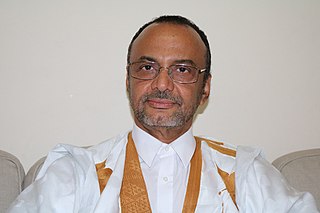
Sidi Mohamed Ould Boubacar is a Mauritanian politician who was Prime Minister of Mauritania, twice, from 1992 to 1996 and again from 2005 to 2007.

The Republican Party for Democracy and Renewal is a political party in Mauritania. Formerly known as the Democratic and Social Republican Party, the party changed its identity and adjusted its political stance after the 2005 coup. Formerly very supportive of President Maaouya Ould Sid'Ahmed Taya and his pro-Israeli policy, after the August 2005 coup, the party denounced Taya's policies and the mid-2006 Israeli military campaign in Lebanon.
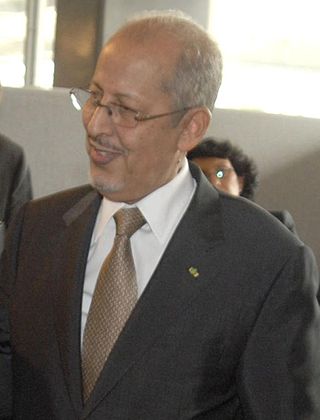
Presidential elections were held in Mauritania on 11 March 2007. As no candidate received a majority of the votes, a second round was held on 25 March between the top two candidates, Sidi Ould Cheikh Abdallahi and Ahmed Ould Daddah. Abdallahi won the second round with about 53% of the vote and took office in April.
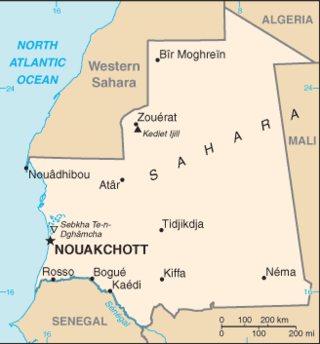
A military coup took place in Mauritania on 3 August 2005. President Maaouya Ould Sid'Ahmed Taya was ousted by the Armed Forces of Mauritania and replaced by the Military Council for Justice and Democracy (CMJD), headed by Ely Ould Mohamed Vall, while Taya was in Saudi Arabia attending the funeral of King Fahd of Saudi Arabia. A constitutional referendum, parliamentary and presidential elections were scheduled and the coup leaders vowed not to contest any of the elections. The military government ended with the presidential election on 11 March 2007 as promised.
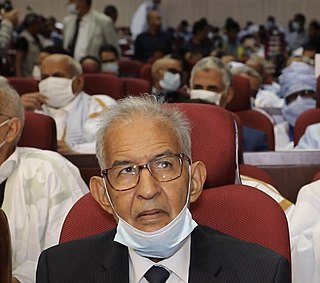
Ahmed Ould Daddah is a Mauritanian economist and a politician. He is a half-brother of Moktar Ould Daddah, the first President of Mauritania, and belongs to the Marabout Ouled Birri tribe. He is currently the President of the Rally of Democratic Forces (RFD) and was designated as the official Leader of the opposition following the 2007 presidential election, in which he placed second.

Sidi Mohamed Ould Cheikh Abdallahi was a Mauritanian politician who was President of Mauritania from 2007 to 2008. He served in the government during the 1970s, and after a long period of absence from politics he won the March 2007 presidential election, taking office on 19 April 2007. He was deposed in a military coup d'état on 6 August 2008.
Saleh Ould Hanenna is a former Mauritanian soldier and political figure.
The People's Progressive Alliance is a small political party in Mauritania.
In December 1984, Haidallah was deposed by Colonel Maaouya Ould Sid'Ahmed Taya, who, while retaining tight military control, relaxed the political climate. Ould Taya moderated Mauritania's previous pro-Algerian stance, and re-established ties with Morocco during the late 1980s. He deepened these ties during the late 1990s and early 2000s as part of Mauritania's drive to attract support from Western states and Western-aligned Arab states. Mauritania has not rescinded its recognition of Polisario's Western Saharan exile government and remains on good terms with Algeria. Its position on the Western Sahara conflict has been, since the 1980s, one of strict neutrality.

Mohamed Ould Abdel Aziz is a retired Mauritanian military officer and politician who served as the 8th president of Mauritania from 2009 to 2019.

Presidential elections were held in Mauritania on 18 July 2009. Mohamed Ould Abdel Aziz, who led the 2008 coup d'état, won a narrow first-round majority in the election, according to official results. A second round, if necessary, would have been held on 1 August 2009.

The 2003 Mauritanian coup d'état attempt was a violent military coup attempt in Mauritania which took place on 8–9 June 2003. The coup attempt, led by Major Saleh Ould Hanenna who commanded a rebel section of the Army, resulted in two days of heavy fighting in the capital Nouakchott, before rebel soldiers were defeated by troops loyal to the President, Colonel Maaouya Ould Sid'Ahmed Taya.













